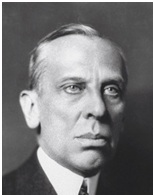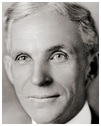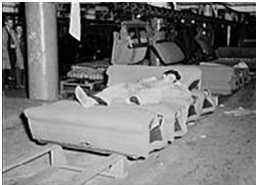|
 |
|
 |
|
|
||
Alfred Sloan Leadership
Alfred Sloan (1875-1966)
American leader of General Motors or GM 1923-46 (pictured right), who made it the world’s most successful and profitable car company ever. His autobiography, My Years with General Motors (1963) is Bill Gates’s favourite business book.
Why was he a great leader?
1. Customer satisfaction He was sensitive to the needs of different customers, wanting to create “a car for every purse and
purpose”. This is why he beat Henry Ford (pictured right), who offered only his Model T. Instead, Sloan sold five products with different prices, colours and styles:
Sales were helped by:
Sloan listened and responded to customers’ comments from car dealer reports and market research surveys. He saw the whole world as GM’s market, so it could:
2. Innovation Sloan was committed to the development of new products through
So he hated groupthink (i.e. people totally agreeing on a decision without thinking). When this happened once, he suggested that the decision be postponed “to give ourselves time to develop disagreement, and perhaps gain some understanding of what the decision is all about”.
3. Purpose Sloan valued creativity more than anything else. “The greatest real thrill that life offers is to create, to construct, to develop something useful”, he said. He also believed that a company’s main responsibility to society was to maximize its profits. The best way to do this, he said, is “more things for more people in more places”.
4. Tough and determined He was ruthless in his aim to make GM successful through:
But he had to allow unions after a successful sit down strike in 1936-7 at GM’s factory in Flint, Michigan (pictured right).
5. Learning
Sloan believed in:
a) learning from successes, failures and
mistakes He thought mistakes are inevitable. “If you do it 51% of the time you will end up a hero”, he said.
b) management education He financed a business school (the Sloan Business School ) at the Massachusetts Institute of Technology.
6. Brilliant organizer He invented the idea of a divisional structure which gave each of GM’s product divisions (like cars) the freedom to run themselves within the broad policies and objectives laid down by Sloan at head office. He called this “federal decentralization”. Co-ordination between the divisions was achieved by committees. 7. Change and improvement He knew that a company has to continuously change and improve, if it is to remain successful and beat its competitors. “There is no resting place for an enterprise in a competitive economy”, he said.
8. Great people He was good at:
Key quote on corporate social responsibility The business of business is business.
Key quote on market segmentation A car for every purse and purpose.
Key quote on decision making Bedside manners are no substitute for the right diagnosis.
Key quote on change No company ever stops changing. Change will come for better or worse.
Key quote on finance The strategic aim of a business is to earn a return on capital.
Key quotes on leadership and management I got better results by selling my ideas than by telling people what to do. Give a man a clear-cut job and let him do it
Key quote on motivation The greatest real thrill that life offers is to create, to construct, to develop something useful. |
|
|
||
|
|
||
| Copyright © wisdomtowin.com 2025 All Rights Reserved | ||
|










